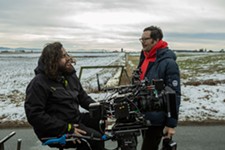DVDanger: Wild Boys
The Boy and other examinations of the pre-teen male mind
By Richard Whittaker, 2:16PM, Wed. Aug. 26, 2015
The boy is the father of the man, as the saying goes. When it comes to the tribulations of saplings in horror movies, the end result is often a terrifying growth of twisted roots. Such is the case in The Boy, a SXSW nail-biter now on VOD from Elijah Wood's Spectrevision shingle.
Wood has been making interesting, difficult choices for films to release, including the Jarmsuchian revisionist vampire revenge flick A Girl Walks Home Alone at Night. That critically-acclaimed release has been seen and interpreted as a profoundly feminist and female-driven narrative. The Boy, as the name makes clear, changes the subject to a nine-year-old with sociopathic tendencies. Its tragedy is the events that swirl around him, letting him be dominated and defined by them.
The environment that raises him is perfect for brooding isolation. Ted (Jared Breeze, who also appears in Wood's upcoming Cooties) lives in a crumbling old roadside hotel in some abstract part of the American West. It's 1989, when the last of such businesses were being wiped off the map, but his father John (the inestimable David Morse) keeps slogging on, hoping somehow there will be something left of the business to hand over to his son. Meanwhile, Ted plays by himself, collects and sometimes creates roadkill, and plays at being a hotel manager, like his father. But there's something silently unnerving about the boy, as a sparse succession of guests – a lost family, a bunch of horny high schoolers, and a near-unrecognizable Rainn Wilson as a man with a crashed car and a sceret to keep – start to recognize.
Loosely adapted from a chapter of Clay McLeod Chapman's killer road-trip novel Miss Corpus, and previously translated as a short by director Craig Macneill as Sundance 2012 short "Henley," this feature-length version is the first in a planned trilogy about the birth of a serial killer. It makes no bones about the fact that there is something critically broken in Ted. The question for the audience is whether it is nature, nurture, or a mixture of both (after all, five miles on the wrong side of the middle of nowhere is probably not the best place to find help for a kid with profound mental health issues). But there's an underlying sense that this is the sequence of events that sends him down that darkest of paths.
The corollary to that is the idea that the right kind of guidance could have redeemed him, maybe a father figure a little stronger or attuned to his son's problems. That's exactly what wolfboy Kai (Gill Eeckelaert) doesn't have in Cub, a forest-shaded Belgian kin to The Boy's sun-blistered desert.
No one does twisted fairytales quite like the Western Europeans, with the implication always there that something evil lurks in the woods. For the boys of a troupe of scouts, it's the story of Kai, the werewolf that lives beyond the treeline and hunts for fresh meat. The scout leaders know that this is all just a campfire yarn, but Sam (Maurice Luitjen) isn't so sure. He may be right: After all, the campsite for their weekend expedition is near an abandoned bus factory. The locals didn't take its closure so readily, and there's something horrible lurking out there.
For Sam, it's Kai, and the narrative is driven by their interactions. Sam shares some of Ted's traits and predilections, but is nowhere near his level of deviousness. Kai is the inner wolf fully unleashed, a primal, snarling, drooling creature of no remorse. Cub presents a conundrum: will Kai drag Sam into his feral hell, or will the boy scout either overcome, or even redeem his atavistic peer?
Director Jonas Govaerts keeps close to the tropes of the camp slasher flick. Weirdly, there's a kinship to the classic The Burning, with its depiction of boys running a little wild in the woods. But there's a grinding inevitability to the descent into a bloody maelstrom, as Kai's unseen and sinister father figure reveals how he has turned the whole forest into a lethal trap for his human prey.
In many ways, The Boy and Cub are more kin than flipsides of the same coin. Near-identical imagery – the passive stares of the protagonists, antlers and horns as a symbol of primal violence – unifies them, but to very different ends. Sam at least has aspirations to end Kai's bloody tactics: and bloody they are, with ruthless barbarism from the first frames. But watching Ted's descent into violence is less a slow rise to the boil and more that moment when a microwaved potato suddenly bursts. Macneill's success is that he makes this inevitable moment still seem shocking. It's in the eyes of John as he stares at the monster he now recognizes in his son, and the blank, uncaring way Ted looks right back at him. Horrifying, and yet utterly convincing.

Cub undoubtedly distinguishes itself from the standard horror dogpile by taking a First Blood-esque approach to a boobytrapped forest. More traditionally, murder haunts have been darkly engineered castles. In the modern era, the terror has been the urban neighbor, especially the one with more space than they could ever possibly need. Wes Craven's The People Under the Stairs manages to combine the two with an urban Gothic sensibility. Back in 1991, the film was revolutionary. It was also a moderate success, pulling in a little under $31 million globally, and weirdly falling off the cinematic agenda for years after. That makes its current release both timely and overdue.
Craven portrays the insane night when a boy named Fool (Brandon Adams, The Mighty Ducks) becomes a man, and not in a Tom Cruise, Risky Business style. Fool lives with his family in the slummiest of all slum apartments, and is literally hours from being evicted. It's only when his sister's boyfriend (a pre-Pulp Fiction Ving Rhames) comes up with a plan to enact a home invasion on their landlords that things gets strange. The Robeson Family of Mommy (Wendy Robie ) and Daddy (Everett McGill) have a fortune hidden away in their rambling mansion, but that's not all that's lurking inside the walls.
This is Craven at his most fascinating and textured. Rather than the cerebral redrawing of horror mythology of the Scream franchise, he redraws dark, Middle European, Brothers Grimm-style fairy tales on the canvas of America's collapsing tenements and projects. The Robeson's trap-filled house would seem as real as the giant's castle in the sky, if it wasn't for the obvious nods to H.H. Holmes' notorious murder castle.
Part of what made People special was that it was one of only two chart-topping films that year with African-American leads. The other, House Party 2, was released literally the week before. However, Craven's story was far more akin to the Gothically subversive wonder of two of the year's quirkier releases, Dead Again and The Addams Family. Still, both those titles lived in the security of the near-aristocratic upper middle classes. This is a tale of class suppression with a subtly woven racial subtext, with Fool as the ghetto kid written off by the Fifties-emulating, picket fence, probably Reagan-voting exploiters of the working class.

Less subtle – nay, glaringly obvious in its political metaphor – is another depiction of the death of innocence. The Riot Club centers on that potentially painful move from school to college: or, more technically, university. Based on Laura Wade's 2010 play Posh, it centers on the most spoiled snobs of all the spoiled snobs of Oxford university, the fictitious Riot Club. A drinking society for the most well-heeled and well-connected of all students, limited to a membership of 10, its newest members are Alistair (Sam Claflin) and Miles (Max Irons). Both are depicted as sons of entitlement, although Alistair is marginally more human (he has a girlfriend from – gasp – the north of England).
There is drinking and mild debauchery and a lot of overly-plummy accents, until the drama finds its groove in the final act. This section – an evening in a pub's private room that spirals out of control – is basically Wade's original script, and the rest of the action is just wadding. It's this moment at which the worst instincts of these pampered boy-men are unleashed in violence and sexual assault. Yet Dogme 95-affiliated director Lone Scherfig has spent so much of the movie making this hapless crowd of Tim Nice-But-Dims seem like affable imbeciles that the change of pace and tone seems hollow. In fact, if she'd just shot Wade's script under the rules of Dogme, it would have been more effective. True, she would have had to sacrifice some shots of dreaming spires, but that's scarcely a loss.
If The Riot Club depicts a suspended adolescence, free from consequence, then the James Cameron-endorsed The Dead Lands is its polar opposite. Like Fool, Hongi (James Rolleston) has great responsibility thrust upon him. The son of a Maori chieftain, he witnesses their tribe's greatest rival's son (Te Hohe Tuhaki) defiling the bones of their ancestors. It's a petty attempt to draw his father's enemies into a tribal war, and when it fails, he butchers them all anyway.
As is inevitably the way of such tales, Hongi is an adolescent on the verge of manhood, suddenly thrust into a role he could not expect: bloodily avenging the death of his entire family, and reclaiming his father's severed head. His only ally is a deranged warrior known to all as the monster of the dead lands (Lawrence Makoare) – a place cursed because the tribe that lived there was butchered, disappearing overnight.
This is a historical piece that, in tone and brutality, cleaves close to the dark mythology of Nicolas Winding Refn's Valhalla Rising, or Michael Mann's rigorously researched The Last of the Mohicans. It gives a sense of a time and a culture – before Western colonists or Pakeha arrived in New Zealand – with an incredibly complicated, rich, and sometimes vicious history. Director Toa Fraser uses Glenn Standring's script to explore the ancient Maori philosophy on war, ancestor worship, glory, and responsibility, as the three protagonists adhere to, reject, and exploit them to their own ends.
On top of that, this is a remarkable action film. Rakau Maori (Maori weaponry) is designed for hand-to-hand, eye-to-eye conflict, but unlike most martial cultures, it replaces metal blades with stone, bone, and hardened woods. The result is a very different style of combat to what you'll usually see, with a terrible elegance. Watching the nameless warrior explain to Hongi how to crush and maim is not the standard mentor/acolyte, Karate Kid montage. Instead, it is one of the most bone-chilling moments of lost innocence imaginable.
The Boy (Chiller Films) is out now on VOD.
The People Under the Stairs (Shout! Factory), Cub (Artsploitation), The Dead Lands (Magnet) and The Riot Club (MPI) are available on DVD, Blu-ray, and VOD now.
A note to readers: Bold and uncensored, The Austin Chronicle has been Austin’s independent news source for over 40 years, expressing the community’s political and environmental concerns and supporting its active cultural scene. Now more than ever, we need your support to continue supplying Austin with independent, free press. If real news is important to you, please consider making a donation of $5, $10 or whatever you can afford, to help keep our journalism on stands.
Richard Whittaker, April 19, 2018
Richard Whittaker, April 3, 2018
Richard Whittaker, July 21, 2018
Richard Whittaker, July 14, 2018
July 12, 2024
July 12, 2024
DVD Watch, DVDanger, VOD, Scream! Factory, Chiller, MPI, Magnet Releasing, The Boy, The People Under the Stairs, Cub, The Riot Club, The Dead Lands















